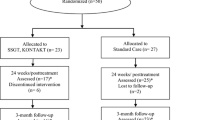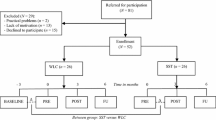Abstract
The effectiveness of a social skills training group for adolescents with Asperger syndrome and high-functioning autism (AS/HFA) was evaluated. Parents of six groups of adolescents (n = 46, 61% male, mean age 14.6) completed questionnaires immediately before and after the 12-week group. Parents and adolescents were surveyed regarding their experience with the group. Significant pre- to post-treatment gains were found on measures of both social competence and problem behaviors associated with AS/HFA. Effect sizes ranged from .34 to .72. Adolescents reported more perceived skill improvements than did parents. Parent-reported improvement suggests that social skills learned in group sessions generalize to settings outside the treatment group. Larger, controlled studies of social skills training groups would be valuable.
Similar content being viewed by others
References
Aman, M. G., Singh, N. N., Stewart, A. W., & Field, C. J. (1985). The aberrant behavior checklist: A behavior rating scale for assessment of treatment effects. Journal of Mental Deficiency, 89, 485–491.
Aman, M. G., Tasse, M. J., Rojahn, J., & Hammer, D. (1996). The Nisonger Child Behavior Rating Form: A child behavior rating form for children with developmental disabilities. Research in Developmental Disabilities, 17, 41–57.
American Psychiatric Association. (2000). Diagnostic and statistical manual of mental disorders IV. Washington, D.C.: American Psychiatric Association.
Barnhill, G. P. (2002). Designing social skills interventions for students with Asperger syndrome. National Association of School Psychologists Communique, 31, 3.
Bieber, J. (1994). Learning disabilities and social skills with Richard Lavoie: Last one picked, first once picked on. Washington, D.C.: Public Broadcasting Service.
Bodfish, J. W. (2004). Treating the core features of autism: Are we there yet? Mental Retardation and Developmental Disabilities Research Reviews, 10, 318–326.
Brown, E. C., Aman, M. G., & Havercamp, S. M. (2002). Factor analysis and norms for parent ratings on the aberrant behavior checklist – community for young people in special education. Research in Developmental Disabilities, 23, 45–60.
Buitelaar, J. K., van der Gaag, R. J., Cohen-Kettenis, P., & Melman, C. T. (2001). A randomized controlled trial of risperidone in the treatment of aggression in hospitalized adolescents with subaverage cognitive abilities. Journal of Clinical Psychiatry, 62, 239–248.
Constantino, J. N., Gruber, C. P., Davis, S., Hayes, S., Passanante, N., & Przybeck T. (2004). The factor structure of autistic traits. Journal of Child Psychology and Psychiatry, 45, 719–726.
Constantino, J. N., Przybeck, T., Friesen, D., & Todd, R. D. (2000). Reciprocal social behavior in children with and without pervasive developmental disorders. Journal of Developmental and Behavioral Pediatrics, 21, 2–11.
Goldstein, A. P., & McGinnis, E. (2000). Skillstreaming the adolescent: New strategies and perspectives for teaching prosocial skills. Champaign: Research Press.
Gray, C. (1994a). The new social story book. Arlington: Future Horizons.
Gray, C. (1994b). Comic strip conversations. Arlington: Future Horizons.
Gresham, F. M., Sugai, G., & Horner, R. H. (2001). Interpreting outcomes of social skills training for students with high-incidence disabilities. Exceptional Children, 67, 331–344.
Howlin, P. (2000). Outcome in adult life for more able individuals with autism or Asperger syndrome. Autism, 4, 63–83.
Howlin, P., Baron-Cohen, S., & Hadwin, J. (1999). Teaching children with autism to mind-read: A practical guide. New York: John Wiley and Sons.
Kanner, L., Rodriguez, A., & Ashenden, B. (1972). How far can autistic children go in matters of social adaptation? Journal of Autism and Childhood Schizophrenia, 2, 9–33.
Krasny, L., Williams, B. J., Provencal, S., & Ozonoff, S. (2003). Social skills interventions for the autism spectrum: Essential ingredients and a model curriculum. Child and Adolescent Psychiatric Clinics of North America, 12, 107–122.
McCracken, J. T., & Research Units on Pediatric Psychopharmacology Autism Network. (2002). Risperidone in children with autism and serious behavioral problems. New England Journal of Medicine, 347, 314–321.
Mesibov, G. B. (1984). Social skills training with verbal autistic adolescents and adults: A program model. Journal of Autism and Developmental Disorders, 14, 395–403.
Ozonoff, S., & Miller, J. N. (1995). Teaching theory of mind: A new approach to social skills training for individuals with autism. Journal of Autism and Developmental Disorders, 25, 415–433.
Pine, E., Luby, J., Abbacchi, A., & Constantino, J. N. (2006). Quantitative assessment of autistic symptomatology in preschoolers. Autism, 10, 344−352.
Rogers, S. J. (2000). Interventions that facilitate socialization in children with autism. Journal of Autism and Developmental Disorders, 30, 399–409.
Schopler, E., & Mesibov, G. B. (1983). Autism in adolescents and adults. New York: Plenum Press.
Shea, S., Turgay, A., Carroll, A., Schulz, M., Orlik, H., Smith, I., & Dunbar, F. (2004). Risperidone in the treatment of disruptive behavioural symptoms in children with autistic and other pervasive developmental disorders. Pediatrics, 114, 634–641.
Sloman, L., & Leef, J. (2004). Child social interaction and parental self-efficacy: Evaluating simultaneous groups for children with Asperger Syndrome and their parents. In K. P. Stoddart (Ed.), Children, youth and adults with Asperger Syndrome (pp. 253–267). London: Jessica Kingsley Publishers.
Strulovitch, J., & Tagalakis, V. (2003). Social skills groups for adolescents with Asperger syndrome. Perspectives on Language, Learning and Education, 10, 20–22.
Tasse, M. J., Aman, M. G., Hammer, D., & Rojahn, J. (1996). The Nisonger Child Behavior Rating Form: Age and gender effects and norms. Research in Developmental Disabilities, 17, 59–75.
Walker H. M., McConnell S., Holmes D., Todis B., Walker B., & Golden, N. (1983). The Walker social skills curriculum: The accepts program. Pro-Ed, Austin.
Acknowledgments
The authors thank Micha Huynh and Sylvie Lafleur for their help in the preparation of this paper. Preliminary results of this project were presented at the Joint Annual Meeting of the American and Canadian Academies of Child and Adolescent Psychiatry in Toronto, 2005.
Author information
Authors and Affiliations
Corresponding author
Rights and permissions
About this article
Cite this article
Tse, J., Strulovitch, J., Tagalakis, V. et al. Social Skills Training for Adolescents with Asperger Syndrome and High-Functioning Autism. J Autism Dev Disord 37, 1960–1968 (2007). https://doi.org/10.1007/s10803-006-0343-3
Received:
Accepted:
Published:
Issue Date:
DOI: https://doi.org/10.1007/s10803-006-0343-3




